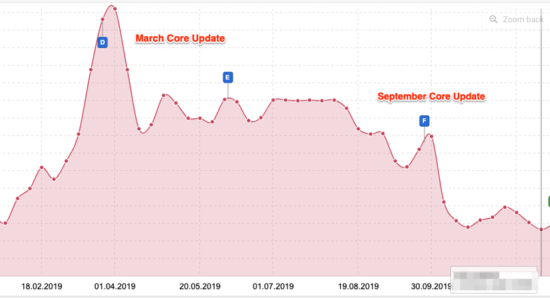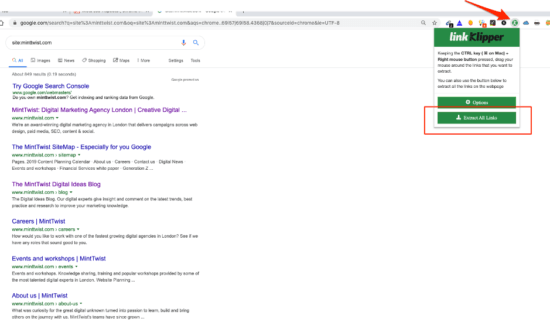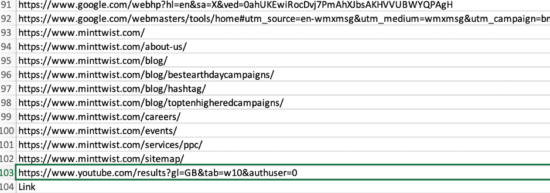How to rank higher on Google and what to do if your traffic suddenly drops
Everyone knows the importance of providing consistent and high-quality content on your website but determining what quality content actually looks like can be a bit tricky.
Why?
Because quality is subjective, of course, and while one person may enjoy one particular style of content, another may find it too long, not relevant enough or simply uninspiring.
Then, of course, you have Google. The Holy Grail of search engines. Everyone wants their content to rank highly on the site that receives over 63,000 searches every second.
That’s around two trillion searches per year by the way.
Download our Individual Member Resource – SEO strategy audit checklist
This SEO strategy audit checklist gives you a comprehensive list of activities to grade your organization against. By completing this checklist every three/six months, you'll be able to measure how your SEO efforts have improved.
Access the SEO strategy audit checklist
With the amount of content available increasing by the second, how can you ensure that your content is ranked higher than your competition?
Let’s first look at how Google evaluates the quality of your content, as this is a key step in helping to understand how to create high ranking content.
How Google evaluates your content quality
Google does not rank content to make your life more difficult, even though it can sometimes feel as though they do. They rank content because they want to provide their users with the best answers or solutions to their queries. It’s important to their users and therefore, it’s important to them.
This is why Google has a set of search quality guidelines to try to help people create high-quality, relevant content that will be beneficial to its users.
So, let’s take a look at how Google evaluates your content quality.
Indexed content
The process of making your page appear on search engine results is called indexing. If you do not index your page in Google, then it will not appear on their search engine results. However, when you successfully index your content, you will automatically get more traffic and any new content you post will be discovered far more quickly.
Therefore, it is vital that you follow the indexing strategies below to ensure Google evaluates your content:
- Ensure that your most important pages are all indexed.
- Review the index using site:domain.com and eliminate any irrelevant pages, weak content or parameter URLs.
- Review the cache of your key pages using cache:domain.com and check to see if a Googlebot has recently crawled onto your website and discovered your most recent live content.
- Review the content itself.
Length of the content
The ongoing and never-ending debate – how long should quality content be?
You could ask 100 SEO experts and they would probably all give you a different answer. Some believe that longer content directly correlates with higher search rankings. Whereas others believe that short and sweet caters better for the short attention spans of today’s users.
However, it’s what Google thinks that really matters, and they have been very clear about how they feel about the importance (or lack of it) when it comes to the word count in evaluating quality content.
In fact, John Mueller, Webmaster Trends Analyst at Google, revealed in August 2019 that ‘word count is not a ranking factor’.
Furthermore, the Google Quality Raters do not even count every word of each piece of content, so why are you bothering?
The amount the content satisfies the user’s query
This is arguably the most important element in ensuring that Google ranks your content highly. They are looking for the content that provides the most standout solution to their users’ queries.
If you provide the best answer for users, Google will rank you highly. It really is that simple.
How do you ensure that your content offers the top solution?
- Ensure that your content is authoritative, trustworthy and offers a high level of expertise.
- Use references from authoritative and trusted websites.
- Link your content to authoritative and trusted websites.
- Ensure that your content is well researched.
Top techniques to reverse a Google Penalty
A Google penalty is a punishment against a website whose content goes against the marketing practices enforced by Google. If you are hit with a Google penalty, you will immediately notice a significant drop in traffic to your site.
There are two easy ways to find out if you have been penalized by Google:
- Via Google Search Console. This is the place where Google communicates with webmasters about any potential problems with their websites.
- Checking your Google Analytics traffic reports. Simply login to Google Analytics and see if you had a drop in traffic around the same time that Google released an algorithmic change. If yes, you most likely received a penalty.
Sistrix is a great tool to review the impact of Google Core Updates on your website visibility by checking its Visibility Index.

A Google penalty can have an extremely negative effect on your website, sending it plummeting down the search ranks. Thankfully, there are ways in which you can reverse a Google penalty and restore your organic search traffic.
Perform a backlink audit
Having unhealthy or dangerous links within your content is a huge no-no for Google and will almost always result in a penalty. Therefore, it is vital that you perform a backlink audit to remove any spam links.
It is also advisable to remove any links from:
- Websites that have been penalized by Google
- Websites that are unrelated to your niche
- Websites with spam comments or forum profiles
- Advertorials
- Adult, gambling or loans websites
- Non-existent backlinks and site-wide backlinks
Perform a content audit
Even if you think you are creating high-quality content, that does not mean that it is effective content. You could be missing out on invaluable keywords, not providing enough information to satisfy user queries, or your content could simply not be formatted in the most productive way.
That is why it is so important to carry out a content audit, and even more so if you have been penalized by Google. Here’s how you are going to do it:
- Generate a list of all your content that has been indexed by Google. This can be done by using Link Kipper, a Google Chrome extension that will allow you to extract all the links on a webpage and export them to a file.

- Once you have exported several files, you should then merge them into one.

- Now you can review your content and make any necessary changes.
Your content amendments for SEO may include:
- ‘Noindex’ any thin content (that being content with little or no value)
- Re-write any low-value pages
- Implement permanent (301) redirects to the most relevant pages
- Remove any pages that are no longer needed
Content and metadata work in partnership
Whilst not visual on the page, ensure your content audit includes your pages' metadata. The Screaming Frog SEO Spider allows you to review both technical and onsite SEO in the same place.
Page titles are a crucial factor in the user's decision to visit your website in the first place.
Putting yourself in your customers' shoes, evaluate your page titles:
Are they effective? Do they draw the reader in? Do they accurately convey what the content is about?
If not, make appropriate changes to ensure that your content is as appealing as possible.
Siteliner is another incredibly useful tool for auditing your content, as it identifies any duplicate content, broken links or redirections.

Carry out a full technical SEO review
If SEO isn’t already one of your top priorities when it comes to your content, then you need to make it one ASAP. However, this is no simple task, as Google is constantly changing and updating their algorithms to ensure that the pages they feature are secure, fast and easy to use for its users.
Therefore, it is very important that you are able to adapt to new SEO tactics, and one of the simplest ways to stay on top of this and avoid Google penalties is by carrying out a technical SEO site audit.
Elements you should consider when carrying out an SEO site review include:
- The hierarchy of your pages. Your content should be clearly structured so that it is easier for Google to analyze your site and index it for search.
- Make sure your site is crawlable. You can do this by checking your robots.txt file, as this is the first port of call for any web-crawling software.
- Check that your site is indexable. The easiest way to do this is by using the site:domain Google search parameter.
- Review your sitemap. Your XML sitemap is a map of your site to Google and is very important as it helps crawlers find and rank your pages. You should ensure your map is correctly formatted, follows XML sitemap protocol and includes all new pages when you create them.
- Fix any errors identified by status codes.
- Check all internal links.
- Evaluate your semantic HTML.
- Identify any AMP problems. Users rank speed high on their list of priorities and, therefore, so does Google.
- Identify any image performance problems that could be affecting your SEO.
- Identify any cache, prefetch or preload problems.
- Check your structured data usage.
It can also be extremely useful to carry out an SEO competitive analysis to ensure that you are always one step ahead of your competition.
- Identify your SEO competitors
- Evaluate your competitors’ total domain strength
- Look out for new keyword opportunities
- Analyze their on-site content
- Look into their backlink profiles
- Examine their sites’ UX
The key to continuously ranking highly on Google is never resting on your laurels.

The needs of users are constantly changing. Google’s algorithms are constantly being updated. Therefore, you need to ensure that you are continually working to improve and overhaul your site and the content posted on it.
If you do this, Google will reward you.
With a digital marketing background in advertising production agencies, Sergio Arboledas specializes in technical SEO at
MintTwist, an award-winning creative digital agency in London that delivers campaigns across web design, paid media, SEO, content & social.












